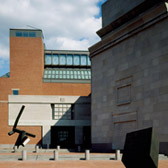August 23, 2013

The United States Holocaust Memorial Museum today expressed deep alarm over the reports of a major chemical weapons attack on civilians in the outskirts of Damascus this week. “The use of chemical weapons against civilians, if proven true, is not only an egregious crime against humanity, but also so reprehensible as to demand an immediate, unequivocal response from the international community,” said Tom Bernstein, chairman of the United States Holocaust Memorial Council.
Bernstein called upon the Syrian government to allow full access to the area of the alleged attack to the United Nations team of chemical weapons experts, and to permit humanitarian aid organizations to tend to the surviving victims. He also called upon the Syrian government and the international community to fulfill their obligations to the people of Syria under the doctrine of the Responsibility to Protect.
Michael Chertoff, former US secretary of homeland security, and chairman of the Committee on Conscience, which oversees the work of the Museum’s Center for the Prevention of Genocide, also voiced alarm over the recent developments. “We cannot stand watching idly as the scale of mass murder in Syria grows ever more rapidly toward genocidal proportions,” he said.
The Museum has been closely monitoring the Syrian conflict, which has already cost more than 100,000 lives, displaced millions, and involved numerous atrocities and crimes against humanity. In June 2012, the Museum warned that the conflict was exhibiting some of the warning signs for genocide. In March 2013, the Museum issued a report by Ambassador Frederic C. Hof analyzing the increasingly sectarian nature of the fighting in Syria, which concluded that, the longer the conflict lasts, the greater is the danger of widespread sectarian mass atrocities and even genocide. If proven, this week’s chemical weapons attack would not be the first in the conflict: in June this year, the White House confirmed that Syria’s Assad regime had used chemical weapons, including the nerve agent Sarin, in several small-scale attacks.
Adopted in 2005 by all UN member states, including Syria, the doctrine of the Responsibility to Protect assigns to every state the responsibility to protect its populations from genocide, war crimes, ethnic cleansing and crimes against humanity. It also charges the international community with the duty to assist states in fulfilling their responsibility to protect their populations from such crimes and to take collective action when a state manifestly fails to protect its populations.
A living memorial to the Holocaust, the United States Holocaust Memorial Museum inspires citizens and leaders worldwide to confront hatred, prevent genocide, and promote human dignity. Visit ushmm.org.
